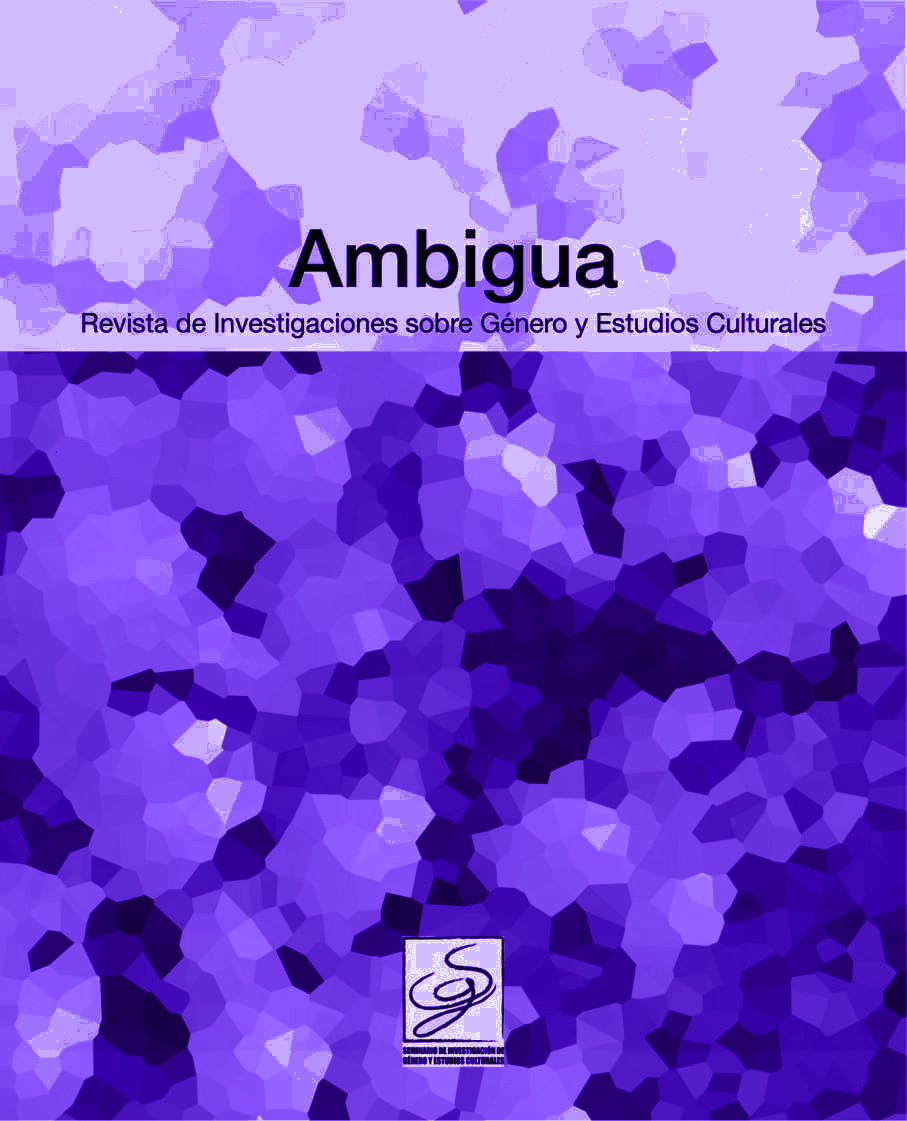It's not (just) eroticism, it's rape. La mujer desnuda and critique:
a case of epistemic injustice.
DOI:
https://doi.org/10.46661/ambigua.8208Keywords:
literature, Uruguay, Writresses, XX century, Feminism, Epistemic injustice, Rape, CisheteropatriarchyAbstract
In this paper we aim to make the connection between academia and militancy, insisting on updating academic practices on the basis of current feminist struggles for more (epistemic) justice. Starting from a dispute that took place in France in 2017 about the pertinence of the use of the term "rape" to characterise a sexual relation in a play by Chénier, we intend to demonstrate the need for a (feminist) political reading from the academy. With this intention, we proceed to a novel analysis of the nouvelle La mujer desnuda (1950; 1967) by the Uruguayan writer Armonía Somers focusing on marital rape. The numerous studies on Somers’s work have focused on the analysis of eroticism, leaving aside what is one of the major taboos of western cisheteropatriarchal society. By focusing our work on this theme, we aim not only to complete and complexify the readings that have been done so far, but also to do justice to Somers's political discourse, which - like most women writers of the same period - has been largely silenced. Throughout the article, we ask why works - even feminist ones - have neglected the subject of marital rape. To do so, we first compare the definition of rape with an excerpt from the nouvelle before proceeding to its analysis in order to justify the use of the term "rape" and to show how Somers deals with this theme. Finally, by broadening the focus, we propose several hypotheses on the reasons why this theme has been ignored. These hypotheses lead us to think about the power relations that sustain the literary field and the academic field.Downloads
References
ABRAMOVICI, Jean-Christophe. 2012. «Anatomie d'un récit de viol : La Nuit et le moment de Crébillon». In Violences du rococo, par Jacques Berchtold, René Demoris, et Christophe Martin. Pessac: Presses universitaires de Bordeaux.
DALMAGRO, María Cristina, coord. 2019. La escritura de Armonía Somers: pulsión y riesgo. Colecciones Escritores del Cono Sur. Sevilla: Editorial Universidad de Sevilla.
DELPHY, Christine. 1998. L'ennemi principal. 1. Économie politique du patriarcat. Paris: Syllepse.
DORLIN, Elsa. 2003. «Les putes sont des hommes comme les autres». Raisons politiques, 11 (agosto): 117 32. https://doi.org/10.3917/rai.011.0117
EAGLETON, Terry. 2016. Una introducción a la teoría literaria. Traducido por José Esteban Calderón. México, D.F.: Fondo de Cultura Económica.
FEMENÍAS, María Luisa. 2002. «Armonía Somers: la difícil andadura de una obra». Orbis Tertius, 8 (9). http://www.orbistertius.unlp.edu.ar/.
FRICKER, Miranda. 2021. «Conceptos de injusticia epistémica en evolución. ISSN-e: 2255-3827. Las Torres de Lucca. Revista internacional de filosofía política 10 (19): 97 103. https://doi.org/10.5209/ltdl.76466
GARCÍA REY, José Manuel. 1976. «Maldición y exorcismo. Veinte y una preguntas a Armonía Somers». Revista Sintaxis, no 2 (avril): 21 28.
GUILHEM, Nadège. 2022. «Convoquer les figures mythiques féminines pour performer le genre». Lectures du genre : (Contre)performances de genre, performativité et résistance, no 16: 46 56. https://lecturesdugenrefr.files.wordpress.com/2023/03/guilhem.pdf.
HARAWAY, Donna. 2004. «Testigo_modesto@segundo_milenio*». In The Haraway Reader. Traducido por Pau Pitarch, 223 50. New York: Routledge.
IBAÑEZ, Agustina. 2021. «Cuerpo, desnudez y silencio en La mujer desnuda de Armoní¬a Somers». Literatura y Lingüística, no 43 (mai): 15 36. https://doi.org/10.29344/0717621X.43.2549.
LAURETIS, Teresa de. 1992. Alicia ya no. Traduit par Silvia Iglesias Recuero. Valencia. Universitat de Valéncia.: Ediciones cátedra.
MANGIN, Annick, Michèle SORIANO. n/s. «Actualité de Silvina Ocampo. Reconnaissance tardive d'un discours littéraire précurseur».
MIGDAL, Alicia. 1986. «Mujeres: del confort a la intemperie». Cuadernos de Marcha, décembre 1986.
PERERA SAN MARTÍN, Nicasio. 2019. «Vigencia de Armonía Somers». In La escritura de Armonía Somers. Pulsión y riesgo, édité par María Cristina Dalmagro. Sevilla: Editorial Universidad de Sevilla.
RICHARD, Nelly. 2011. «Qué es un territorio de intervención política?» In Por un feminismo sin mujeres. Fragmentos del Segundo Circuito de Disidencia Sexual, édité par AA.VV. Santiago: CUDS.
RUBIN, Gayle. 1998. «L'économie politique du sexe : transactions sur les femmes et systèmes de sexe/genre». Les cahiers du CEDREF, no 7 (janvier): 3 81. https://doi.org/10.4000/cedref.171.
SEGATO, Rita Laura, Alejandra de Santiago Guzmán, Edith Caballero Borja, et Gabriela González Ortuño. 2017. «La estructura de género y el mandato de violación». In Mujeres intelectuales. Feminismos y liberación en América latina y el Caribe. Colección Antologías del Pensamiento Social Latinoamericano y Caribeño. CLACSO.
Downloads
Published
How to Cite
Issue
Section
License
Copyright (c) 2023 Nadège GUILHEM

This work is licensed under a Creative Commons Attribution-NonCommercial-ShareAlike 4.0 International License.
The authors agree with the following:
1. Authors retain copyright and grant the journal right of first publication with the work simultaneously licensed under a license Attribution-NonCommercial-ShareAlike 4.0 International (CC BY-NC-SA 4.0) that allows others to share the work with an acknowledgement of the work's authorship and initial publication in this journal.
2. Authors are able to enter into separate, additional contractual arrangements for the non-exclusive distribution of the journal's published version of the work (e.g., post it to an institutional repository or publish it in a book), with an acknowledgement of its initial publication in this journal.
3. Authors are permitted and encouraged to post their work online (e.g., in institutional repositories or on their website) prior to and during the submission process, as it can lead to productive exchanges, as well as earlier and greater citation of published work (See The Effect of Open Access).









